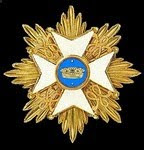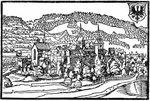As it has been taking so long to write up the backlog of Prussian flags, here is another French flag with a mercifully short write up.
The first set are as depicted on the 1757 manuscript illustration.
The second set are as described in the French 18th century regulations and by Pierre Charrié:
In 1721 the flags were depicted as without the ship and with a far greater number of gold fleurs de lys. I have taken the design of the ship from the 1757 manuscript illustration; in the regulations throughout the 1740s and 1750s the ship is described as gold, although almost all modern illustrations use a coloured version, as described by Pierre Charrié.
Royal Des Vaisseaux was first raised for sea service in 1638. It had 2 battalions in the Seven Years War.
The regiment was very active in the War of the Spanish Succession and the War of the Austrian Succession. Its Seven Years War was rather quieter.
In 1756 it was encamped at Granville. Fifty men under the command of the chevalier d'Eyrauges on the Iles Chaussey were attacked on the 19th July by a British squadron. For defence d'Eyrauges and his men had only an uncompleted fort and a single cannon. However, the defence was maintained so convincingly that the British were persuaded to give them the honours of war and conveyed the detachment to the mainland. The regiment spent the winter at Coutances and Bayeux and then in 1757 moved to the coast of Saintonge (on the Atlantic coast). It was in Brittany in 1758 and in that year at the battle of Saint-Cast on the 11th September where Captain La Canorgue was killed (see for the battle: https://en.wikipedia.org/wiki/Battle_of_Saint_Cast and http://www.kronoskaf.com/syw/index.php?title=1758-09-11_-_Combat_of_Saint-Cast). The battle was disastrous for the British and was the last British attack on mainland France in the war. As British MP Henry Fox said specifically of the raid on Rochefort in September 1757 but in general of the British policy of raiding the French coasts, it was like "breaking windows with guineas", that is to say, much effort and expense (of money and lives) for very little gain. (A guinea was a coin in the old British Imperial currency worth 21 shillings or one pound one shilling. I remember in the pre-decimal 1960s that expensive academic books were often priced at 63 shillings or 3 guineas.)
Royal-Vaisseaux occupied in succession the towns of Dinan, Niort, La Rochelle and Bayonne, all on the western coast of France. In 1762 the regiment was part of an auxiliary corps sent to Spain to fight against the Portuguese. Returning to France at the beginning of the following year, it occupied first Montlouis and Villefranche and then moved on to Toulouse in May 1763.
(Much of the text above is taken from Susane Volume 5, with additional text by me.)
And this is the illustration of the uniform (and flags) from the 1757 manuscript:





















More beautiful work, David! Another of my freshly painted 15mm SYW Irish regiment will be sporting your flags very soon.
ReplyDeleteAnother great post. Love the flag, it’s a shame this regiment didn’t serve in Germany. Although St Cast is always tempting.
ReplyDeleteThanks, Jonathan. Look forward to seeing those new troops in action! :-)
ReplyDeleteCheers,
David.
Thanks, Peter. Yes, I agree about the regiment's lack of involvement in Germany - but it did mean I could get the post done without a long spiel on its service in the SYW! I am grateful for that... ;-)
ReplyDeleteSt Cast is interesting, isn't it? Rather a Dieppe of the SYW. It would be a challenge to try to do a wargame version. (The Perrys recently did a version of the British landing at Aboukir Bay in 1801 (https://www.youtube.com/watch?v=O8_kb2ShgT0) which has similar problems representing the action; and the British casualties there were very heavy too, although the landing was ultimately successful.)
Cheers,
David.
It’s got great potential for a series of linked actions in a ladder campaign. Landing, overland March with river crossings and then a beach head evacuation.
ReplyDeleteeach time I am dazzled by the skill required to make these flags
ReplyDeleteonce again a thousand thanks
Yes, Peter; it sounds ideal for a mini-campaign. I'll add it to my (long) list of wargames ideas I'd like to try eventually...
ReplyDeleteAre you thinking of trying it sometime?
Cheers,
David.
Thanks, Ronald. Kind of you to say so. :-)
ReplyDeleteI will finally get round to posting more Prussian flags soon - and I might also post some beautifully detailed Russian Guards' flags too in the near future...
Cheers,
David.
Hi David,
ReplyDeleteThere are some pics of your flags in action on my blog https://youdonotknowthenorth.blogspot.com
They look great and really set off the battalions. Thanks again for making them available.
Blogger uiduach OB said...
ReplyDelete>Hi David,
>There are some pics of your flags in action on my blog >https://youdonotknowthenorth.blogspot.com
> They look great and really set off the battalions. Thanks again for making >them available.
Figures and flags look splendid! :-) Thanks for mentioning my blog and the flags too.
Cheers,
David.
Hi Jonathan https://www.blogger.com/profile/07862373894196924886,
ReplyDeleteI tried posting a comment on your blog showing your latest French-Irish troops with my flags and looking very good too; I'm not sure if it got through, though. Can you let me know if it did, please? Thanks.
All the best,
David.
Hi David. Yes, your post went through without incident. Your post did not show immediately because I turn moderation on after a post has aged three days. That cuts down on receiving any random SPAM
ReplyDeleteAh, thanks, Jonathan. I wondered as I have quite often had comments disappear on occasion when trying to reply to blog posts.
ReplyDeleteThe flag is looking superb. I have to look for a chance to replace my flag on my Royal Vaisseaux regiment. However I could at least give the right flag to my Provence infantry.
ReplyDeleteThanks, André. Yes, you really must add the new flags to your troops. :-) Thanks too for the pictures of Poitou; flags and troops look splendid!
ReplyDeleteAll the best for 2021,
David
Brilliant work.
ReplyDeleteI will have to change the size of my flag and then print it again...
Meanwhile I will finish two bases of Auvergne grenadiers and send you photos as one of them has flags. I could not resist to make at least a portion of the unit to get the flag on the "battlefield" of Dettingen and Rocoux where it fought with distinction.
Thanks, André. It was your suggestion that made me do it! :-) I look forward to seeing it in action with your troops - as well as the flags of Auvergne with your grenadiers.
ReplyDeleteAs part of my Francovexillomania (a term I just invented :-)) I am tempted to do at least some of the flags of units disbanded after the WAS as they were often of unusual and attractive designs which were not used again in the French army...
All the best,
David.